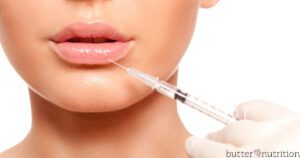Have you taken antibiotics?
I sure have. But now I avoid them as much as possible because the costs of overuse are just too high. Here's why...
1) Contribute to the development of autoimmune disease
By definition, antibiotics mean "anti-life" and the key role of the powerful drug is to kill all bacteria, not discriminating against good or bad. So when you take antibiotics, it can cause an imbalance in the gut creating an opportunistic environment for bad bacteria to overgrow. Bad bacteria produce lipopolysaccharide or endotoxins that can damage the delicate lining of the gut making it leaky (also called intestinal permeability) and allow inappropriate matter to pass through into the bloodstream causing a reaction (like proteins or toxins).
So what's the link with intestinal permeability and autoimmunity? According to the British Society of Gastroenterology, "in several autoimmune conditions it appears that increased permeability is a constant and early feature of the disease process." [3]
2) Trigger food allergies
With antibiotics taking such a toll on the delicate balance of the gut, and increasing the likelihood of intestinal permeability, it's no wonder they can trigger food allergies. In a recent article, Gabe Noble reports from that:
Dr. Martin Blaser, a microbiologist and professor at New York University, is working tirelessly on groundbreaking research into this dramatic spike in food allergies. His hypothesis is that exposure to antibiotics early in life is diminishing positive gut bacteria and thus weakening children's immune systems, making them more susceptible to allergies. Blaser warns parents: "Antibiotics are not free, they do have a cost. And it is not just monetary but in the development of the immunity in children."
3) Drug induced liver injury (DILI)
According to this 2008 study, "Antibiotics are the single largest class of agents that cause DILI." [1]
A 2017 study, paints a similar picture: "Some widely used antibiotics such as amoxicillin-clavulanate have been shown to have a delayed onset on liver injury and recently cefazolin has been found to lead to liver injury 1-3 weeks after exposure of a single infusion. The other extreme is the nature of nitrofurantoin-induced liver injury, which can occur after a few years of treatment and lead to acute liver failure (ALF) or autoimmune-like reaction. Most patients with liver injury associated with use of antibiotics have a favorable prognosis. However, patients with jaundice have approximately 10% risk of death from liver failure and/or require liver transplantation. In rare instances, the hepatoxicity can lead to chronic injury and vanishing bile duct syndrome." [17]
If you're in the know about how important your liver and gallbladder health are to how you feel (and age), drug induced liver injury is not something to take lightly. Get more information on the risk associated with specific antibiotics from the LiverTox Database.
4) Increase cancer risk
If autoimmune disease, food allergies and liver damage aren't enough of a deterrent to take personal responsibility for your body and do everything you can to support your health to prevent getting yourself into a position to have to take antibiotics, how does cancer sound?
According to the International Journal of Cancer, "those who had taken 2-5 antibiotic prescriptions had a 27% increase in cancers compared to those who took none. Those who took six or more prescriptions had a 37% increase in cancers." The study also noted that the "findings of the present study suggest that antibiotic use, especially repeated prescriptions is associated with increased risk of cancer." [5]
A recent study from 2021 paints a graver picture, "There is a clear link between taking antibiotics and an increased risk of developing colon cancer within the next five to ten years. This has been confirmed after a study of 40,000 cancer cases. The impact of antibiotics on the intestinal microbiome is thought to lie behind the increased risk of cancer." [15]
5) Immune system suppression
Have you ever noticed that taking antibiotics can make you more prone to repeat infection?
That's immune system suppression at work! According to Dr. Mercola, "We take antibiotics when we are sick, when our immune systems weaken. The mycotoxins pharmacies dispense for use as antibiotics only exacerbate the problem, because the lion's share of these substances have been shown to be immunosuppressants (CAST Report No. 116. November 1989.). Not only are they capable of hamstringing our immune systems, they also destroy the friendly bacteria that guard our intestines." [7]
Dr. Mercola also warns, "Remember, antibiotics are dangerous mycotoxins - fungal metabolites. Just as importantly, medical experts have written articles maintaining that these drugs kill people. But, other experts insist on remaining skeptical as to the problem, even though these same experts readily recognize the link between weakened immune systems and death." [7]
6) Weight gain
According to researchers from Johns Hopkins Bloomberg School of Public Health, antibiotic use can trigger weight gain in children, when compared to those who do not take antibiotics as frequently. This trend likely continues through adulthood.
"The results showed that at age 15, children who had received antibiotics seven or more times during childhood weighed about three pounds more than those who had never taken the drugs. Approximately 21 percent of the study participants -- about 30,0000 kids -- had taken antibiotics seven or more times during childhood." [8]
7) Permanent damage
Some antibiotics are far riskier than others. The fluoroquinolones family of antibiotics fall into that category.
According to the FDA:
"Fluoroquinolones are antibiotics that kill or stop the growth of bacteria. While these drugs are effective in treating serious bacterial infections, a FDA safety review found that both oral and injectable fluroquinolones are associated with disabling side effects involving tendons, muscles, joints, nerves and the central nervous system. These side effects can occur hours to weeks after exposure to fluoroquinolones and may potentially be permanent." [11]
FDA-approved fluoroquinolones include:
- levofloxacin (Levaquin)
- ciprofloxacin (Cipro)
- ciprofloxacin extended-release tablets
- moxifloxacin (Avelox)
- ofloxacin
- gemifloxacin (Factive)
8) Long-term microbiome changes
Antibiotics are known to decrease the diversity of microbes in the gut, and a new study suggests those changes just may be permanent.
According to Dr Liam Shaw (UCL Genetics Institute and CoMPLEX), "If you picture the state of the microbiome as a ball resting in a valley, antibiotics can 'kick' the ball up and out of the valley into a different valley, where it may not be able to return to the first one." [12]
9) Increased depression
Antibiotics are well known to not only kill bad bacteria, but also to kill good bacteria (like lactobacillus and bifidobacteria).
So after you've taken a course, you're primed for opportunistic bacteria overgrowth because your 'good bacteria' protection was wiped out.
A major player in overgrowth after taking antibiotics is an increase in gram negative bacteria. These gram negative bacteria contain LPS or endotoxin which is a pro-inflammatory compound that is a part of the bacteria and is released when they die.
The link between antibiotics and depression is clear:
- antibiotics reduce bifidobacteria, a source of mood-supportive B-vitamins
- LPS or endotoxin shunts tryptophan from being made into the neurotransmitter, serotonin, and instead is shuttled down the Kynurenine pathway (proteobacteria is a major phylum of gram negative and endotoxin releasing bacteria that often become opportunistic after antibiotic use)
- LPS or endotoxin slows the production of SAMe which is important to methylation (think anxiety, insomnia and less creatine)
Knowledge is POWER
This article is not meant to say there is never a reason for antibiotics, often there is! But antibiotics are grossly over-prescribed.
According to Dr. Wilson, "Doctors prescribe antibiotics at what can only be termed an incredible rate. According to several studies done around the year 2000, obstetricians and gynecologists wrote 2,645,000 antibiotic prescriptions every week. Internists prescribed 1,416,000 per week. This works out to 211,172,000 prescriptions annually, just for the two specialties! Pediatricians prescribe over $500 million worth of antibiotics annually just for one condition, ear infections."
As you can see, the cost antibiotic overuse is very high and shouldn't be taken lightly.
If you know your gut-liver axis been impacted by antibiotic use, the following tools can be incredible to help you get your gut back on track:
As with everything else, knowledge is power, and applying that knowledge is even better.
Pin it:
References:
- http://www.ncbi.nlm.nih.gov/pubmed/18955056
- http://chriskresser.com/the-healthy-skeptic-podcast-episode-4
- http://www.ncbi.nlm.nih.gov/pmc/articles/PMC1856434/
- http://news.yahoo.com/dr--martin-blaser-researches-link-between-food-allergies-in-children-and-antibiotics-111302595.htmlc
- http://onlinelibrary.wiley.com/doi/10.1002/ijc.23622/full
- http://www.drlwilson.com/articles/antibiotics.htm
- http://articles.mercola.com/sites/articles/archive/2003/06/18/antibiotics-bacteria.aspx
- http://www.cbsnews.com/news/too-many-antibiotics-may-be-making-kids-fatter/
- Photo Credit: Depositphotos.com/markcarper
- Photo Credit: Depositphotos.com/mirusiek
- http://www.fda.gov/NewsEvents/Newsroom/PressAnnouncements/ucm513183.htm
- https://www.technologynetworks.com/biopharma/news/how-antibiotics-change-human-microbiome-diversity-long-term-317454
- https://pubmed.ncbi.nlm.nih.gov/25539109/
- https://pubmed.ncbi.nlm.nih.gov/28276834/
- https://www.sciencedaily.com/releases/2021/09/210901090057.htm#:~:text=Summary%3A,the%20increased%20risk%20of%20cancer.








bekhouche hamid says
As always, your articles are very helpful and very well backed by rich references.This is really a professional work.I adore to learn from sweet Catherine
Take care!